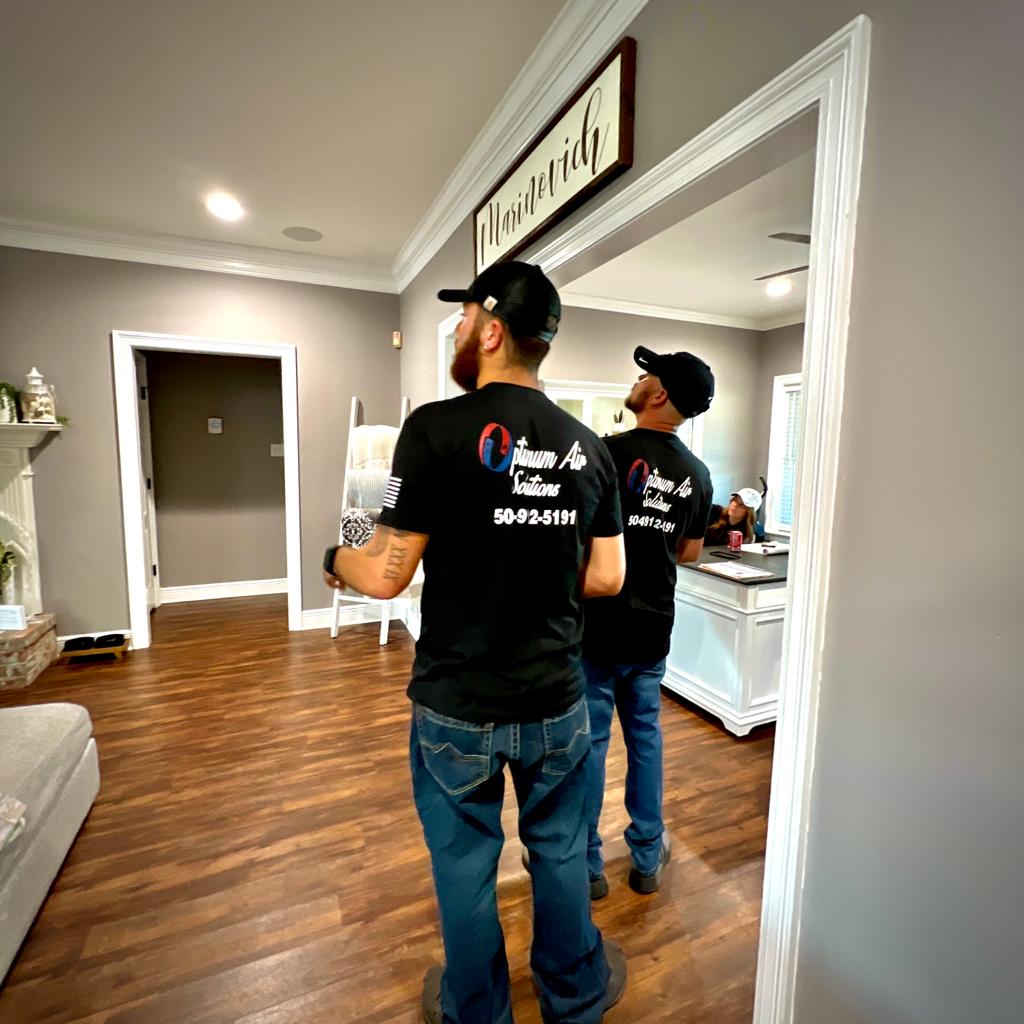
Struggling with your home or office’s comfort levels? Wondering about the importance of humidity balance in your HVAC system or why proper humidity control is vital for your HVAC?
Well, you’re not alone. Many folks underestimate how humidity affects their heating and cooling systems, which can lead to various problems.
Do you deal with dry, itchy skin in the winter or too much moisture and mold in the summer? If so, don’t worry. This article is here to help. We’ll talk about why keeping the right humidity in your HVAC system matters and how it can make your indoor space super comfy all year round.
So, let’s get started to find out Why Proper Humidity Control is Vital for Your HVAC.
- Why Proper Humidity Control is Vital for Your HVAC?
- 1. Comfort:
- 2. Health:
- 3. Energy Efficiency:
- 4. Protecting Your Home:
- 5. Productivity:
- Importance of Humidity Control
- When Humidity is Too Low:
- When Humidity is Too High:
- The Benefits of Balanced Humidity with HVAC:
- Tips to Maintain Humidity Level with the Help of HVAC
- 1. Use a Humidifier or Dehumidifier:
- 2. Invest in a Whole-House System:
- 3. Regular Maintenance:
- 4. Seal Leaks and Insulate:
- 5. Use Exhaust Fans:
- 6. Programmable Thermostat:
- 7. Monitor Humidity Levels:
- 8. Proper Ventilation:
- 9. Seasonal Adjustments:
- 10. Seek Professional Help:
- Are you Looking for a Professional HVAC Services Provider in Belle Chasse?
Why Proper Humidity Control is Vital for Your HVAC?

Understanding why humidity levels matter is essential to creating a comfortable and healthy indoor environment. Humidity, or the amount of moisture present in the air, has a significant impact on various aspects of our daily lives.
Here’s why maintaining the right humidity level is crucial:
1. Comfort:
Humidity affects how we perceive temperature. When the air is too dry, it can make us feel colder than it actually is, leading to discomfort during the winter months.
Conversely, high humidity can make us feel warmer than the actual temperature, causing discomfort in the summer. Balancing humidity ensures a more comfortable living or working space year-round.
2. Health:
Humidity plays a vital role in our respiratory health. When humidity levels are too low, the dry air can irritate our nasal passages and throat, making us more susceptible to respiratory problems like allergies and asthma.
On the other hand, excessive humidity fosters the growth of mold and dust mites, which can trigger allergies and worsen existing health conditions.
3. Energy Efficiency:
Maintaining the right humidity level can help your heating and cooling systems work more efficiently. When the air is too dry, your heating system has to work harder to maintain a comfortable temperature.
Conversely, high humidity can cause your air conditioner to work overtime. Balancing humidity reduces energy consumption, leading to potential cost savings on your utility bills.
4. Protecting Your Home:
Extreme humidity levels can harm your home’s structure and furnishings. Too much moisture can lead to rot, mold, and wood damage, while excessively dry air can cause wood to crack and paint to peel. Proper humidity control helps preserve your home and belongings.
5. Productivity:
In a workplace, maintaining the right humidity level can boost employee productivity. Uncomfortable indoor conditions can lead to distractions, discomfort, and decreased focus. Balanced humidity contributes to a more conducive work environment.
By understanding the importance of humidity and effectively controlling it with your HVAC system, you can create a more enjoyable and sustainable living or working environment.
Now let’s discuss what happens when there’s a high, low, or balanced humidity level in your home or workspace.
Importance of Humidity Control
Here’s what happens due to different levels of humidity control.
When Humidity is Too Low:
Imagine a dry, winter day when the air feels crisp and chilly. If your indoor humidity levels are too low, you may experience discomfort and various issues.
Here’s what can happen:
- Dry Skin and Irritation: Low humidity can sap moisture from your skin, leaving it feeling dry and itchy. This can be particularly bothersome during the winter months.
- Respiratory Problems: Insufficient humidity can lead to dry nasal passages and throat, potentially causing or exacerbating respiratory issues like allergies and asthma.
- Static Electricity: You might notice static shocks when touching metal objects or other people, which can be both surprising and annoying.
When Humidity is Too High:
On the flip side, excessively high humidity levels can also bring about a set of problems:
- Mold and Mildew Growth: High humidity creates a breeding ground for mold and mildew, leading to musty odors and potential health hazards.
- Discomfort: Your indoor space may feel stuffy and uncomfortable, making it difficult to relax or concentrate.
- Increased Cooling Costs: Running your air conditioner to combat high humidity can significantly increase your energy bills.
The Benefits of Balanced Humidity with HVAC:
Achieving the right balance of humidity with your HVAC system is the key to resolving these issues. When your HVAC system effectively controls humidity, you can enjoy several benefits:
- Enhanced Comfort: Balanced humidity levels make your indoor space more comfortable year-round, whether it’s a hot summer day or a cold winter night.
- Improved Health: Maintaining optimal humidity can reduce the risk of respiratory problems, allergies, and skin irritations.
- Energy Efficiency: Your HVAC system operates more efficiently when humidity levels are balanced, potentially saving you money on energy bills.
This is why you should always maintain humidity level in your home or workspace.
But how can you do that? Let’s discuss this in detail.
Tips to Maintain Humidity Level with the Help of HVAC
Here are some easy to follow tips to maintain humidity level with the help of HVAC system.
1. Use a Humidifier or Dehumidifier:
Depending on your needs, consider adding a humidifier or dehumidifier to your HVAC system. A humidifier adds moisture to the air when it’s too dry, while a dehumidifier removes excess moisture when humidity is high.
2. Invest in a Whole-House System:
Whole-house humidifiers and dehumidifiers integrated with your HVAC system can provide consistent and precise humidity control for your entire home, ensuring uniform comfort in every room.
3. Regular Maintenance:
Keep your HVAC system in good working condition by scheduling regular AC maintenance and service checks. Clean filters and coils can help your system operate efficiently, which is essential for humidity control.
4. Seal Leaks and Insulate:
Properly insulate and seal your home to prevent outside air from affecting indoor humidity levels. Leaks and drafts can introduce uncontrolled humidity variations.
5. Use Exhaust Fans:
In areas prone to high humidity, like bathrooms and kitchens, use exhaust fans to remove excess moisture. This helps maintain a balanced humidity level in your home.
6. Programmable Thermostat:
Invest in a programmable thermostat that allows you to set and maintain specific humidity levels. Some thermostats can even integrate with your HVAC system to automate humidity control.
7. Monitor Humidity Levels:
Use a hygrometer, a simple humidity measuring device, to monitor humidity levels in your home. This will help you adjust your HVAC settings as needed.
8. Proper Ventilation:
Ensure proper ventilation in your home to allow for air circulation. This can help prevent stagnant air and maintain consistent humidity levels.
9. Seasonal Adjustments:
Be mindful that humidity requirements change with the seasons. You may need to adjust your HVAC system’s settings to accommodate different humidity levels in summer and winter.
10. Seek Professional Help:
If you’re uncertain about how to control humidity effectively with your HVAC system, consult with a professional HVAC technician. They can provide guidance, install equipment, and ensure your system is optimized for humidity control.
So, that was the article regarding why proper humidity control is vital for your HVAC.
Are you Looking for a Professional HVAC Services Provider in Belle Chasse?
Are you looking for a professional HVAC services provider in Belle Chasse? Look no further than Optimum Air Solutions. We specialize in HVAC repair, installation, and maintenance, ensuring your indoor comfort all year round.
Our experienced team is dedicated to delivering top-notch service and ensuring your HVAC system operates at its best. Whether you need a quick fix, a new installation, or regular maintenance, we’ve got you covered.
Contact us today for all your HVAC needs and experience the difference with Optimum Air Solutions.
continue reading
Related Posts
For homeowners, a functional air conditioning (AC) system is an
You truly cannot overstate the importance of efficient hot water
When it comes to efficiently cooling your home, ductless AC



